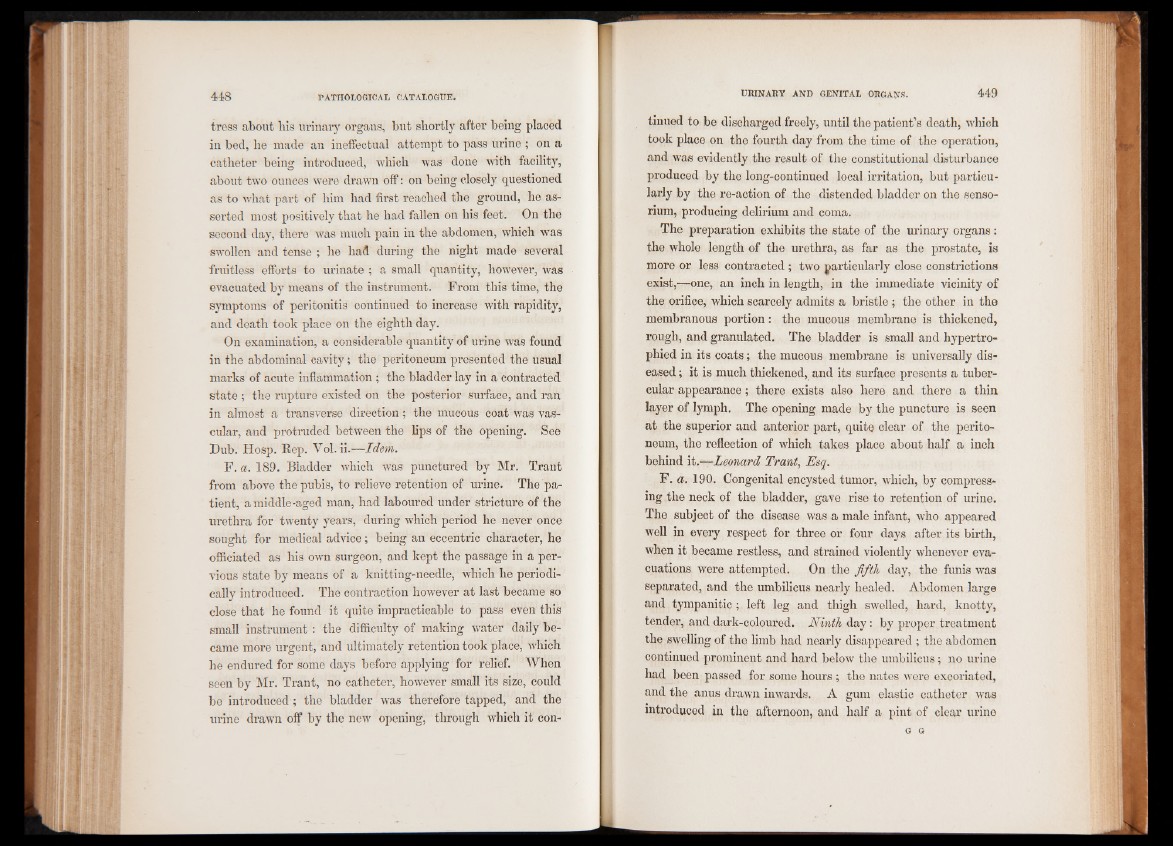
tress about his urinary organs, but shortly after being placed
in bed, he made an ineffectual attempt to pass urine ; on a
catheter being introduced, which was done with facility,
about two ounces were drawn off: on being closely questioned
as to what part of him had first reached the ground, he asserted
most positively that he had fallen on his feet. On the
second day, there was much pain in the abdomen, which was
swollen and tense ; he had during the night made several
fruitless efforts to urinate ; a small quantity, however, was
evacuated by means of the instrument. From this time, the
symptoms of peritonitis continued to increase with rapidity,
and death took place on the eighth day.
On examination, a considerable quantity of urine was found
in the abdominal cavity; the peritoneum presented the usual
marks of acute inflammation ; the bladder lay in a contracted
state ; the rupture existed on the posterior surface, and ran
in almost a transverse direction; the mucous coat was vascular,
and protruded between the lips of the opening. See
Dub. Hosp. Rep. Vol. ii.—Idem.
F. a. 189. Bladder which was punctured by Mr. Trant
from above the pubis, to relieve retention of urine. The patient,
a middle-aged man, had laboured under stricture of the
urethra for twenty years, during which period he never once
sought for medical advice; being an eccentric character, he
officiated as his own surgeon, and kept the passage in a pervious
state by means of a knitting-needle, which he periodically
introduced. The contraction however at last became so
close that he found it quite impracticable to pass even this
small instrument : the difficulty of making water daily became
more urgent, and ultimately retention took place, which
he endured for some days before applying for relief. When
seen by Mr. Trant, no catheter, however small its size, could
be introduced; the bladder was therefore tapped, and the
urine drawn off by the new opening, through which it continued
to be discharged freely, until the patient’s death, which
took place on the fourth day from the time of the operation,
and was evidently the result of the constitutional disturbance
produced by the long-continued local irritation, but particularly
by the re-action of the distended bladder on the senso-
rium, producing delirium and coma.
The preparation exhibits the state of the urinary organs:
the whole length of the urethra, as far as the prostate, is
more or less contracted; two particularly close constrictions
exist,—one, an inch in length, in the immediate vicinity of
the orifice, which scarcely admits a bristle; the other in the
membranous portion: the mucous membrane is thickened,
rough, and granulated. The bladder is small and hypertrophied
in its coats; the mucous membrane is universally diseased
; it is much thickened, and its surface presents a tubercular
appearance; there exists also here and there a thin
layer of lymph. The opening made by the puncture is seen
at the superior and anterior part, quite clear of the peritoneum,
the reflection of which takes place about half a inch
behind it.-—Leonard Trant, Esq.
F. a. 190. Congenital encysted tumor, which, by compressing
the neck of the bladder, gave rise to retention of urine.
The subject of the disease was a male infant, who appeared
well in every respect for three or four days after its birth,
when it became restless, and strained violently whenever evacuations
were attempted. On the fifth day, the funis was
separated, and the umbilicus nearly healed. Abdomen large
and tympanitic; left leg and thigh swelled, hard, knotty,
tender, and dark-coloured. Ninth day: by proper treatment
the swelling of the limb had nearly disappeared ; the abdomen
continued prominent and hard below the umbilicus; no urine
had been passed for some hours; the nates were excoriated,
and the anus drawn inwards. A gum elastic catheter was
introduced in the afternoon, and half a pint of clear urine
G G